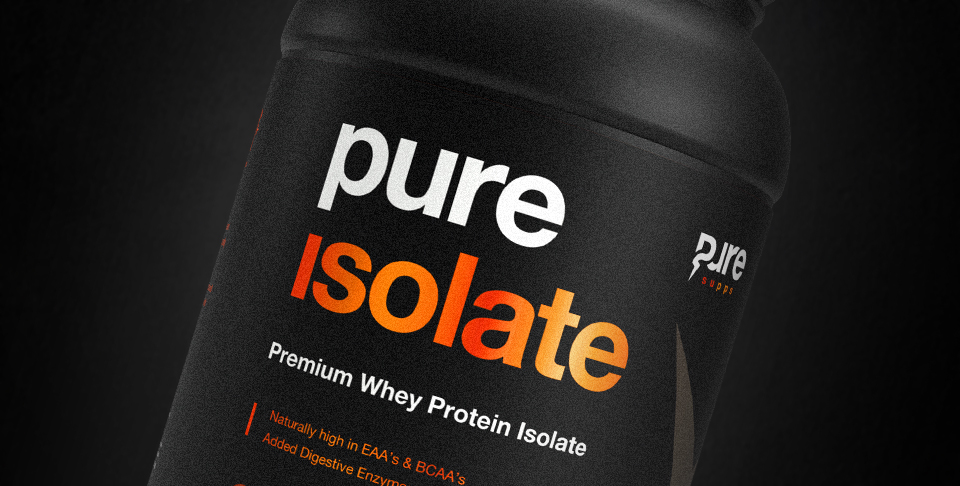Free Shipping - 48hrs Only | Use Code: FREESHIP
Ends 26/04 11:59PM AEST Min spend $79
WPI (Whey Protein Isolate): The Short Summary
- Whey protein isolate (WPI) is a form of whey protein that has been processed to remove impurities such as carbs & fats.
- WPI has more protein per gram & faster absorption compared to whey protein concentrate & other protein types.
- WPI is derived from milk and there are different production techniques used to make it, including microfiltration, ultrafiltration, & ion exchange.
- Studies have demonstrated the benefits of WPI, including increased strength, lean gains, & recovery time.
- WPI's fast-release properties allow for faster absorption, making it the best form of protein for post-workout consumption.
- WPI can also promote satiety and reduce hunger, making it useful for weight management goals.
- WPI contains very little lactose, making it a viable option for people with lactose intolerance.
- One potential downside of WPI is that some beneficial nutrients may be removed during processing.
- Manufacturers may fortify their WPI powders to reintroduce lost nutrients.
- WPI can be found as a stand-alone protein powder or as an ingredient in blended protein powders & weight gainers.
- Raw WPI may contain over 91% protein, but finished products may contain less due to additives & flavourings.
- A genuine flavoured WPI protein powder percentage would be in the 83-91% range.
- WPI can be stacked with other protein supplements.
- WPI is more expensive than most other forms of protein, but its benefits make it a worthwhile investment.
- A balanced diet & regular exercise are essential in achieving fitness goals alongside WPI intake.
WPI: Everything You Need to Know
As a regular trainer at the gym or bodybuilder, you're likely familiar with the benefits of protein supplements. One such supplement that has continued to gain popularity is whey protein isolate or WPI. In this article, we'll dive into what WPI is, where it comes from, how it's made, & its benefits & potential drawbacks.
What is WPI?
WPI is a form of whey protein that has been processed to remove impurities such as carbs & fats, resulting in a higher purity protein with more protein per gram & faster absorption compared to a whey protein concentrate. This makes WPI a superior form of protein for bodybuilders or athletes who want the most out of their protein powder.
Where Does WPI Come From?
WPI comes from whey protein, which is derived from milk. There are many production techniques used to make WPI, including microfiltration, ultrafiltration, and ion exchange. Each technique has its advantages and disadvantages, and some manufacturers use a combination of methods to produce their WPI products.
WPI Manufacturing Methods
There are a number of manufacturing methods employed to produce WPI. These include Microfiltration which involves passing the milk through a series of filters to remove impurities & Ultrafiltration which uses a similar process with larger filters. There is also Ion exchange which is becoming less common, & involves using chemicals to separate the protein from other milk components. Each method has its benefits & drawbacks, such as cost, purity, & the removal of beneficial nutrients.
WPI Benefits
WPI offers all the benefits of whey protein, including increased muscle strength, lean muscle gains, and faster recovery time. Its high purity also makes it the supplement of choice for exercise nutrition scientists. Numerous aged peer-reviewed studies have demonstrated the benefits of WPI, including a 2006 study by Cribb et al that showed WPI supplementation increased strength, lean gains, & recovery time.
One other key benefit of WPI is its fast-release properties, which allow for faster absorption compared to whey protein concentrate and many other types of protein powder. This means that WPI can quickly deliver amino acids to the muscles, promoting faster recovery & muscle growth after a workout. As a result, it is often recommended as the best form of protein for post-workout consumption.
Additionally, WPI helps promote satiety & reduce hunger, making it a valuable tool for weight management goals.
WPI Benefits for Lactose Intolerance
WPI contains very little lactose, making it a viable option for people with lactose intolerance. However, it's still not suitable for people with milk protein allergies. Should you be lactose intolerant a plant-based protein powder would may also be a good option.
WPI Negatives & Side Effects
One potential downside of WPI is that some beneficial nutrients may be removed during processing, such as growth factors and glycomacropeptides. However, some manufacturers fortify their WPI powders to reintroduce lost nutrients. Additionally, WPI is more expensive than other forms of protein including WPC, micellar casein & plant proteins.
WPI Recommended Dose & Ingredient Timing
WPI is best taken immediately post-workout at a 30g serve size, although this amount may be varied depending on your personal goals. It can also be used throughout the day to meet daily protein intake requirements. However, as WPI is relatively expensive, it may be best saved for post-workout use.
WPI Supplements
WPI can be found as a stand-alone protein powder. It is also a common ingredient in blended protein powders, weight gainers, & pretty much any other variety of protein powder.
WPI Protein Percentage
One thing to make note of when shopping for WPIs is that although raw WPI may contain 90% + protein, it is unlikely for a finished product to contain this amount of protein because of flavours, sweeteners, & other additives diluting the product. Therefore, beware of manufacturers that claim their flavoured WPI products contain over 91% + protein. A more realistic genuine WPI protein percentage would be 83-91%.
Stacking WPI
Whey protein isolate (WPI) is a highly versatile supplement that can be stacked or combined with almost all types of supplements. One popular combination is to stack WPI with creatine monohydrate to enhance strength & muscle gains. Another option is to combine WPI with beta-alanine to increase endurance during workouts. Additionally, carbohydrates such as dextrose or maltodextrin can be added to WPI post-workout to replenish glycogen stores & promote muscle recovery.
WPI in Conclusion
WPI is a highly pure & fast-absorbing form of protein that offers numerous benefits for bodybuilders & fitness enthusiasts. While it may be more expensive than other forms of whey protein, its ability to promote faster recovery, muscle growth, & satiety makes it a worthwhile investment for those seeking to optimize their protein intake. WPI should be prioritised primarily as a post-workout protein powder. Alongside a balanced diet & regular exercise, WPI can be a valuable tool in achieving your fitness goals.
Cribb et al (2006), The Effect of Whey Isolate and Resistance Training on Strength, Body Composition, and Plasma Glutamine. International Journal of Sport Nutrition and Exercise Metabolism, 16: 494-509
Hayes & Cribb (2008), Effect of whey protein isolate on strength, body composition and muscle hypertrophy during resistance training. Curr Opin Clin Nutr Metab Care 11: 40-44
Huffman & Harper (1999), Maximizing the value of milk through separation technologies. Journal of Dairy Science, 82: 2238-2244



